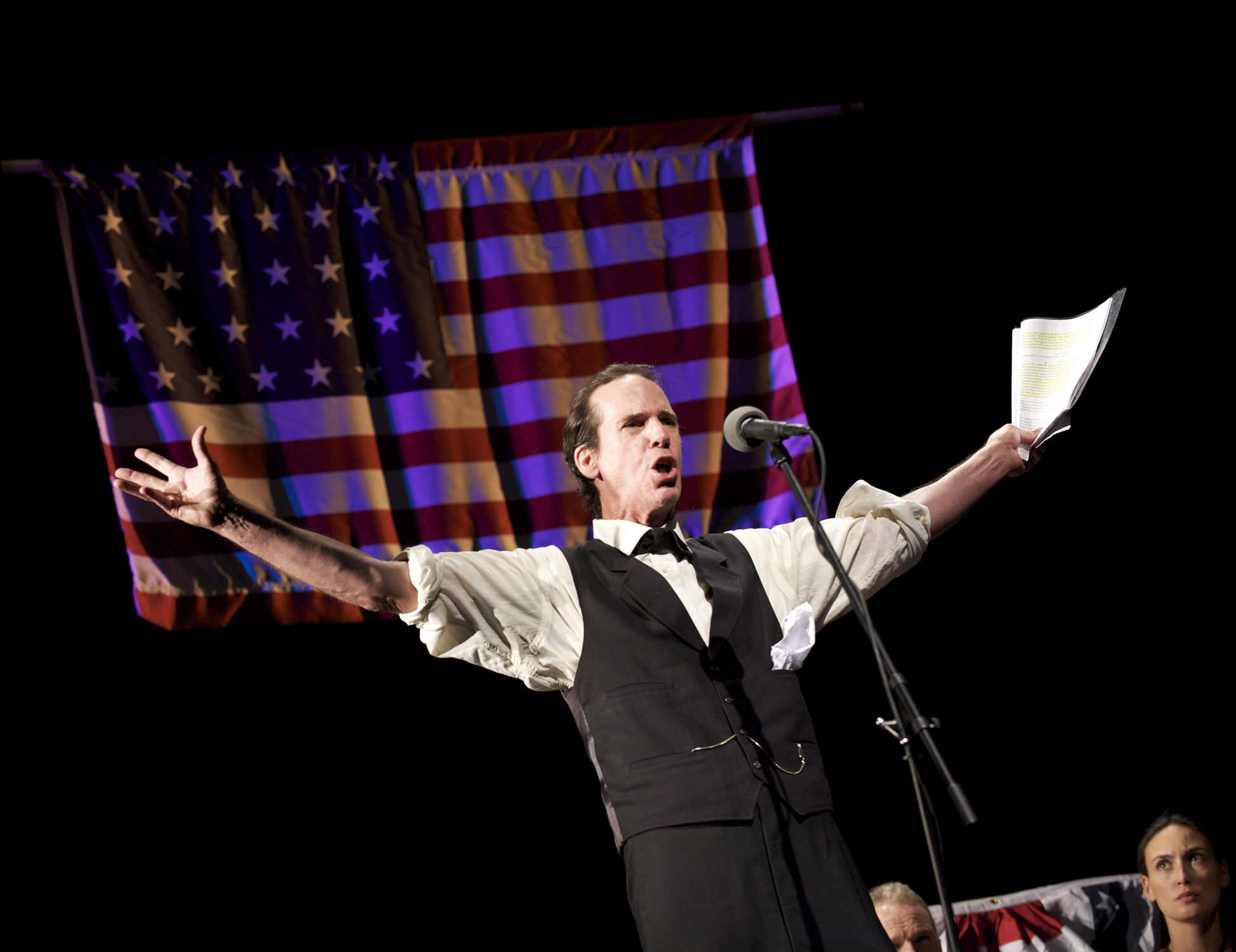The political environment that exists today in the United States is dominated by professional politicians manufactured especially to be elected. Perfectly groomed hair, flag lapel pins and the perfect tie have all become part of the political game — a game where for some, the ultimate goal is holding office and moving up the political ladder at all costs. The audience of The Rivalry, presented Friday night in Palmer by L.A. Theatre Works and onStage, was reminded that this wasn’t always the case, and that even politicians locked in cutthroat, history-defining competition can be willing to lay down their dreams for the good of their nation.
Modeled on the historic Lincoln-Douglas debates, The Rivalry tells the story of two politicians that embodied their era like no others, each out to alter the course of history at a time in which future of our nation hung in a tender balance. In 1858, Stephen A. Douglas, then incumbent Senator of Illinois, was the most famous public man in all of America, even more well-known and influential than then-President, James Buchanan. In The Rivalry, Douglas is made out to be a self-satisfied man, a polished speaker and most likely the closest man the time had to a professional politician. Lincoln, on the other hand, is seen as tall, lanky, and – at times – unconventional. Despite this, Lincoln is a fantastic character, with the power to captivate and move the audience with perfectly told and timed yarns, and a combination of great emotion and impermeable logic that is undeniably absorbing.
Robert Parsons, who played Lincoln, fit the role impeccably, with speeches fired off so full of passion that it’s hard to believe that they’re scripted. It was also worth noting how perfectly Parsons fits the role in stature; his silhouette on stage, adorned with Lincoln’s signature stovepipe-top-hat, sends chills.
When I was considering what this play may possibly be like, I was a bit concerned that it would fall short of conventional intellectual entertainment. Everyone loves plays, but plays based on historical debate? I was skeptical, even as a self-professed history nerd.
Within moments of the play’s beginning, however, all traces of skepticism went out the door. It’s one thing to watch a modern political debate on television, but it’s another thing entirely to watch a believable enactment of a world-changing historical debate, based upon real stenographic record. The context of the Lincoln-Douglas debates is important to remember; they came at a time when our nation was ideologically divided along pro-slavery and abolitionist lines. There were already talks of breaking the union, which of course came three years later with the commencement of the Civil War. The Lincoln-Douglas debates became prominent nationally as a stage for the fleshing out of the main issues of slavery.
Lincoln, a Republican, supported the abolition of slavery, purporting radical ideas such as the equality of all men and races. In words taken from Lincoln in debate, “If God gave him but little, that little let him enjoy.” Douglas, on the other hand, spoke to his Democratic base by arguing the superiority of the white race and right for states to decide for themselves whether slave owning would be legal. The debates themselves were fiery and tense, as both men were obviously adamant about the validity of their views. As the debates increased in size, the speeches improved, especially on the part of Lincoln. Douglas at times reduced himself to making personal attacks, in a move that conjures up images of the politicians we see campaigning nowadays.
Douglas, played by Josh Clark, is a puzzling figure. His reputation from his day has to be respected, but his methods, without touching his opinions, are questionable. Due to what can likely be attributed to high-handed political maneuvers, Douglas wins the Senatorial election, leaving Lincoln and his passionate political voice empty-handed. Yet due to the publicity received because of the Lincoln-Douglas debates, Abraham Lincoln is catapulted into the national spotlight, and eventually, as we all know, the presidency.
More importantly, the context leading to Lincoln’s ascent to presidency is presented in the heart-wrenching Second Act. His biggest opponent in the 1860 election is none other than Stephen Douglas. Their last clash in the Illinois Senatorial Election left the two men as rivals with great deals of respect for one another. In a heartbreaking scene, Douglas privately concedes to Lincoln, telling Adele that he stands no chance to Lincoln nationally. Adele, previously the voice of reason, prods Douglas to push onward, denying that Lincoln has him beat. Douglas, however, has other interests in mind than his desire to be in the White House; rather than campaign onward, Douglas reveals to Adele that he plans to begin a series of campaign stops in the south to urge his conservative constituency not to secede from the Union. In essence, this is political suicide on the part of Douglas, and one must consider the gravity of the situation put up against his egotism. Douglas sacrifices his political career and his dreams for the betterment of the nation, in a move that can only be called one of the most courageous and selfless in political history.










